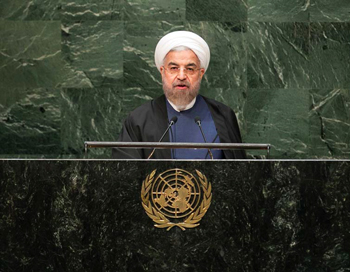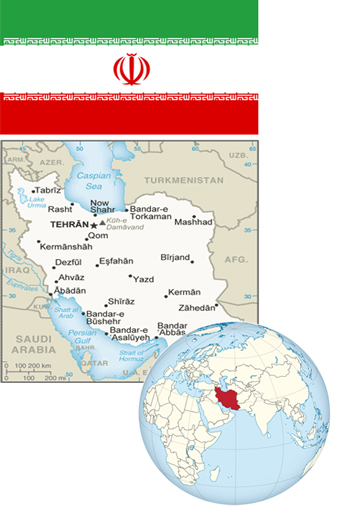Iran Presdient: Justice and development will uproot extremism
By Iranian President Hassan Rouhani -Guest Columnist- | Last updated: Oct 14, 2014 - 6:54:01 PMWhat's your opinion on this article?
(Below is an edited version of Iranian President Hassan Rouhani’s address to the United Nations General Assembly Sept. 25 in New York. This excerpt focuses on extremism and terrorism with thoughts on what must be done to bring peace to the Middle East and the world.)

Hassan Rouhani, President of the Islamic Republic of Iran, addresses the general debate of the sixty-ninth session of the General Assembly Sept. 25. Photo: UN Photo/Cia Pak
‘Today’s anti-Westernism is a reaction to yesterday’s racism. Certain intelligence agencies have put blades in the hand of madmen, who now spare no one. All those who have played a role in founding and supporting these terror groups must acknowledge their errors that have led to extremism.’ |
Mr. President, I am coming from a region of the world whose many parts are currently burning in the fire of extremism and excess. To the East and West of my country, extremists threaten our neighbors, resort to violence and shed blood. They of course do not speak a single language; they are not of a single skin color and not of a single nationality; they have come to the Middle East from around the world.
They do however have a single ideology: violence and extremism. They also have a single goal: the destruction of civilization, giving rise to Islamophobia and creating a fertile ground for further intervention of foreign forces in our region.
I deeply regret to say that terrorism has become globalized: From New York to Mosul, from Damascus to Baghdad, from the Easternmost to the Western most parts of the world, from Al-Qaeda to Daesh [the Arabic acronym for the Islamic State of Syria and Iraq]. The extremists of the world have found each other and have put out the call: extremists of the world unite. But are we united against the extremists?

|
To fight the underlying causes of terrorism, one must know its roots and dry its source fountains. Terrorism germinates in poverty, unemployment, discrimination, humiliation and injustice. And it grows with the culture of violence. To uproot extremism, we must spread justice and development and disallow the distortion of divine teachings to justify brutality and cruelty. The pain is made greater when these terrorists spill blood in the name of religion and behead in the name of Islam. They seek to keep hidden this incontrovertible truth of history that on the basis of the teachings of all divine prophets, from Abraham and Moses and Jesus to Mohammed, taking the life of a single innocent life is akin to killing the whole humanity. I am astonished that these murderous groups call themselves an Islamic group. What is more astonishing is that the Western media, in line with them, repeats this false claim, which provokes the hatred of all Muslims. Muslim people who every day recall their God as merciful and compassionate and have learned lessons of kindness and empathy from their Prophet, see this defamation as part of an Islamophobic project.
The strategic blunders of the West in the Middle East, Central Asia, and the Caucuses have turned these parts of the world into a haven for terrorists and extremists. Military aggression against Afghanistan and Iraq and improper interference in the developments in Syria are clear examples of this erroneous strategic approach in the Middle East. As non-peaceful approach, aggression, and occupation target the lives and livelihoods of ordinary people, they result in different adverse psychological and behavioral consequences that are today manifested in the form of violence and murder in the Middle East and North Africa, even attracting some citizens from other parts of the world. Violence is currently being spread to other parts of the world like a contagious disease. We have always believed that democracy cannot be transplanted from abroad; democracy is the product of growth and development; not war and aggression. Democracy is not an export product that can be commercially imported from the West to the East. In an underdeveloped society, imported democracy leads only to a weak and vulnerable government.
When generals step into a region, do not expect diplomats to greet them warmly; when war begins, diplomacy tends to end. When sanctions set in, deep hatred for those imposing them also begins. When the atmosphere of the Middle East is securitized, the answer will be of the same nature as well.
The interests of Western countries in our region are tied to their recognition of beliefs and the desire of the people for democratic governance in the region.
The experience of creation of Al-Qaeda, the Taliban, and modern extremist groups have demonstrated that one cannot use extremist groups to counter an opposing state and remain impervious to the consequences of rising extremism. The repetition of these mistakes despite many costly experiences is perplexing.
Let’s recall that Iran had invited everyone to “dialogue” before the criminal act of September 11th, and also called for “a world against violence and extremism” before the outbreak of the current violent atrocities. Perhaps in the past year, few people could forecast the fire that would rage today. But now uninhibited violence and extremism presents an imminent threat to the world. It is self-evident that without an accurate understanding of how the current condition came about we will not be able to find the right solutions. …
The Middle East longs for development and is weary of war. It is the natural right of the peoples of the fertile lands of the Middle East to live in peace and prosperity. In the past, colonialism denied them this right, and today; the shadow of war and violence threatens their security. There are moderate politicians and elites in our region who enjoy the confidence of their peoples. They are neither anti-Western nor pro-Western. While aware of the role of colonialism in the backwardness of their nations, they are not neglectful of the role of their nations in reaching the development they seek. They do not absolve the West from its misdeeds, but are also aware of their own failings. These leaders can take positions of active leadership by attracting the confidence of the people in their societies and establish the strongest national and international coalitions against violence.
The voices of these leaders are the true voices of moderation in the Islamic world; the familiar sound of an Afghan tired of war; an Iraqi victim of extremism, a Syrian fearful of terrorism; and a Lebanese worried over violence and sectarianism. I believe this is a strategic mistake, if countries claiming leadership of the coalition do so to continue their hegemony in the region.
INSIDE STORIES AND REVIEWS
-
-
About Harriett ... and the Negro Hollywood Road Show
By Rabiah Muhammad, Guest Columnist » Full Story -
Skepticism greets Jay-Z, NFL talk of inspiring change
By Bryan 18X Crawford and Richard B. Muhammad The Final Call Newspaper @TheFinalCall » Full Story -
The painful problem of Black girls and suicide
By Charlene Muhammad -National Correspondent- » Full Story -
Exploitation of Innocence - Report: Perceptions, policies hurting Black girls
By Charlene Muhammad -National Correspondent- » Full Story -
Big Ballin: Big ideas fuel a father’s Big Baller Brand and brash business sense
By Bryan Crawford -Contributing Writer- » Full Story






 Click Here Stay Connected!
Click Here Stay Connected!








